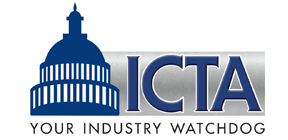
PREV ARTICLE
NEXT ARTICLE
FULL ISSUE
PREV FULL ISSUE
ACTF PUBLISHES COUNTERFEIT COIN SURVEY RESULTSThe Anti-Counterfeiting Task Force (ACTF) of the Industry Council for Tangible Assets (ICTA) has published the results of a
survey aimed at understanding the nature and extent of the problem of counterfeit coins and bars in the numismatic marketplace. Here's an
excerpt, -Editor
Silver, gold American Eagles most counterfeited bullion coins
A new survey conducted by the Anti-Counterfeiting Task Force indicates the popular U.S. bullion coins are now leaders in a category their manufacturer would rather not be in – the most frequently encountered bullion coin counterfeits. Some 43.3 percent of U.S. coin dealer respondents to the survey report customers seeking to sell them counterfeit silver American Eagle bullion coins. Similarly, 41.2 percent report customers trying to sell them fake gold American Eagle bullion coins. The most frequently encountered fake foreign gold bullion coins include the South African gold Kruggerand at 30.4 percent, the Canadian gold Maple Leaf at 24.2 percent, and Mexican gold 50 pesos at 20.1 percent. 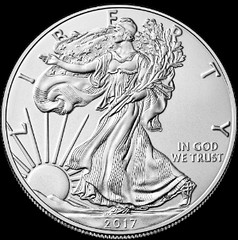 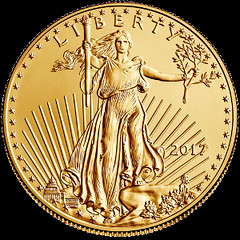 Real 2017 silver and gold American Eagle bullion coins. “The survey results are not surprising to us,” said Beth Deisher, the Industry Council for Tangible Assets Director of Anti-Counterfeiting. “Counterfeiters -- primarily from China -- target the most popular products, usually market leaders with the highest brand identification.” 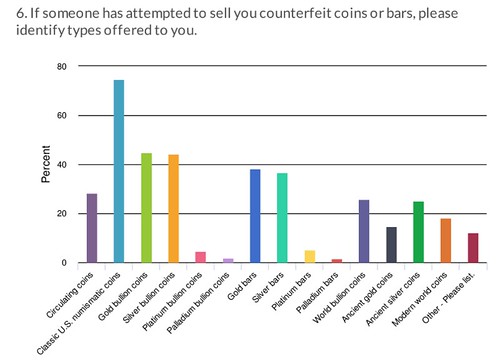 She cited survey results in two other categories – bullion bars and collectible classic U.S. coins. PAMP (Suisse) gold ingots and bars are the worldwide market leader; 57.8 percent of U.S. dealers in the survey reported customers seeking to sell them counterfeit gold PAMP bars and 36.1 percent reported encountering fakes of Australia’s Perth Mint gold bars. For silver, fakes of privately minted bars bearing the logos of the SilverTowne Mint, 24.7 percent, and the private Sunshine Mint (19.9 percent) registered highest in the survey. Among collectible classic U.S. coins, Morgan silver dollars at 71.7 percent led the list of most frequently encountered counterfeits, followed by Trade dollars, 66.6 percent; Seated Liberty dollars, 48.6 percent; Lincoln cents, 35.9 percent; Peace dollars, 33.1 percent; and Early American copper large cents and half cents, 29.7 percent. Among collector gold U.S. coins, 42. 1 percent of the dealers reported counterfeits of the $2.50 gold coin are the most frequently encountered, followed by fakes of $5 gold, 36.2 percent; $20 gold, 33.4 percent; $1 gold, 33.1 percent; and $10 gold, 27.6 percent. 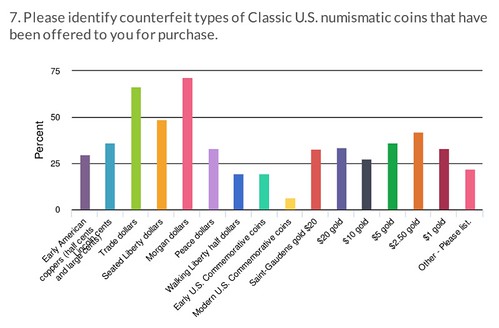 Deisher noted it is illegal to possess, buy, or sell counterfeits of U.S. or foreign coins and that most dealers refuse to knowingly purchase fakes. “Dealers tell us they often encounter people who have unknowingly purchased fake coins or bars via the internet or from flea markets thinking they have gotten a bargain because the price they paid is a fraction of the market value of the real items. When they attempt to sell their “bargains” to dealers they learn there is no Santa Claus in numismatics. Their fakes are worthless.” Deisher said. She said that dealers also encounter people trafficking in counterfeits who know exactly what they are trying to sell. “The traffickers are quick to leave when they realize they can’t fool the dealer,” Deisher explained. To read the full press release, see: 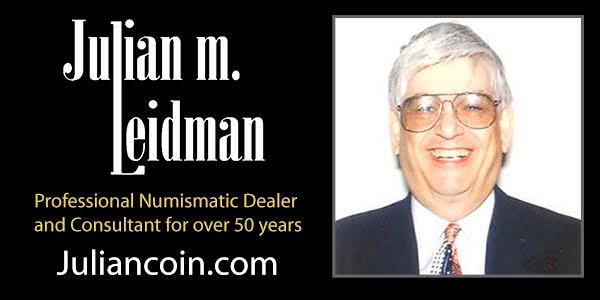 Wayne Homren, Editor The Numismatic Bibliomania Society is a non-profit organization promoting numismatic literature. See our web site at coinbooks.org. To submit items for publication in The E-Sylum, write to the Editor at this address: whomren@gmail.com To subscribe go to: https://my.binhost.com/lists/listinfo/esylum All Rights Reserved. NBS Home Page Contact the NBS webmaster 
|
